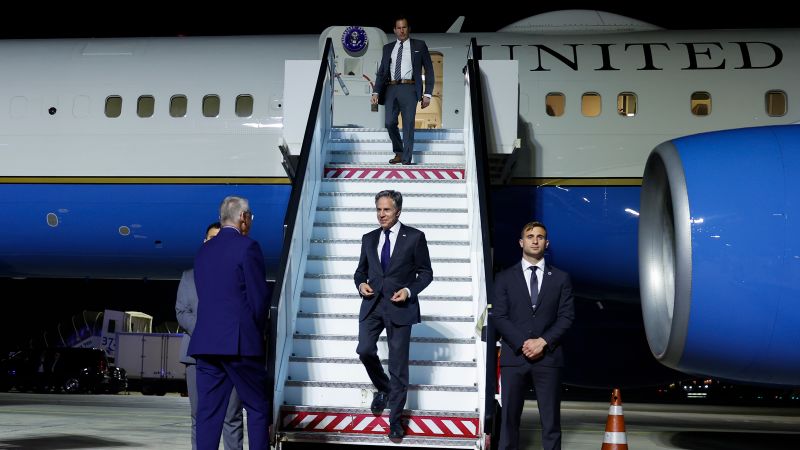US Secretary of State Antony Blinken is currently engaged in high-stakes talks in Israel as the United States aims to pressure Hamas into accepting a ceasefire and releasing hostages. Blinken is working to prevent an Israeli military offensive in Rafah and address the humanitarian crisis in Gaza. He arrived in Tel Aviv on Tuesday after visiting Saudi Arabia and Jordan, marking his seventh round of shuttle diplomacy in the region since Hamas’ attack on October 7.
There is some optimism among US officials regarding the possibility of reaching an agreement to secure a ceasefire and the release of hostages held by Hamas. Israel presented what Blinken described as an “extraordinarily generous” proposal, and the US is hopeful that an agreement can be reached in the coming days. Blinken emphasized that the Israeli proposal demonstrates a willingness to compromise and now it is up to Hamas to act without delay.
Negotiators from Egypt, Qatar, the US, and Hamas have gathered in Cairo to consider a new framework proposed by Egypt. This framework suggests that Hamas releases up to 33 hostages kidnapped from Israel in exchange for a pause in hostilities in Gaza. Israel has helped craft this proposal but has not fully agreed to it yet. The country is awaiting a response from Hamas before deciding whether to send its own delegation to Cairo.
While the US is focused on securing a deal to improve the long-term situation in Gaza, Blinken is also pushing Israeli officials to take immediate action to address the humanitarian catastrophe in the region. His visit follows the deadly Israeli strike on a World Central Kitchen aid convoy in Gaza, which prompted criticism from the Biden administration. Blinken has warned that there will be changes in policy if Israel does not make the necessary changes to address the humanitarian crisis.
Blinken noted that a first tranche of aid from Jordan was being sent into Gaza through the Erez crossing, but emphasized that more needs to be done to ensure the well-being of people in Gaza. He emphasized the importance of focusing on the impact of aid rather than just the number of trucks entering Gaza. Blinken will continue to address concerns about a potential large-scale military offensive in Rafah, where a significant civilian population is at risk.
Despite Prime Minister Netanyahu’s threat of carrying out an offensive in Rafah with or without a deal, US officials do not believe that such an offensive is imminent. Blinken has expressed concern about the potential consequences of a major military operation in Rafah that does not effectively protect civilians. The US continues to work towards a ceasefire agreement and addressing the humanitarian crisis in Gaza while urging all parties to prioritize the well-being of civilians in the region.













